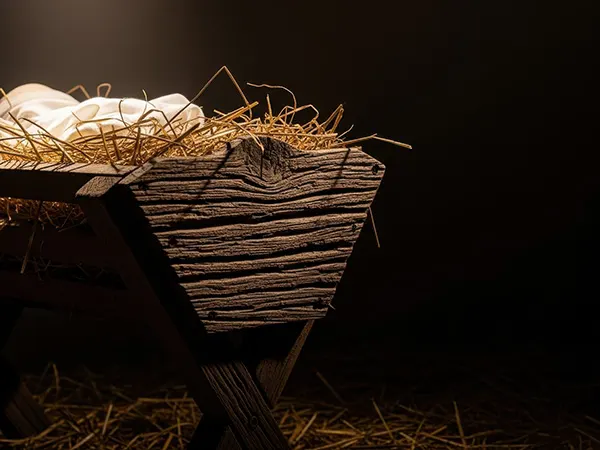
Year
Is the Kingdom of God Within You? (February 18, 2026)
Jesus said many enigmatic things, but Luke 17:21 is not one of them. He said plainly, "The Kingdom of God is among you," but many have interpreted it to mean some ethereal entity that resides within each person. Its context and the meaning of the Greek underlying argue for a simple, literal understanding that illuminates the nature of God's Kingdom. Richard Ritenbaugh explains that Jesus spoke of a real, soon-coming Kingdom, of which He is King.
Jesus said many enigmatic things, but Luke 17:21 is not one of them. He said plainly, "The Kingdom of God is among you," but many have interpreted it to mean some ethereal entity that resides within each person. Its context and the meaning of the Greek underlying argue for a simple, literal understanding that illuminates the nature of God's Kingdom. Richard Ritenbaugh explains that Jesus spoke of a real, soon-coming Kingdom, of which He is King.
Struggling to Coexist (February 11, 2026)
American history can be read as a series of conflicts between two dominant but opposed worldviews struggling to coexist within the same nation. Sometimes, the factions spar without much bloodshed, but at other times, deadly warfare takes a grievous toll. Two factions are exchanging blows over illegal immigration, and deaths have already occurred. Joseph Baity asks if calmer heads will prevail, or if this will be the existential crisis of our time.
American history can be read as a series of conflicts between two dominant but opposed worldviews struggling to coexist within the same nation. Sometimes, the factions spar without much bloodshed, but at other times, deadly warfare takes a grievous toll. Two factions are exchanging blows over illegal immigration, and deaths have already occurred. Joseph Baity asks if calmer heads will prevail, or if this will be the existential crisis of our time.
Holy Days: Passover (February 4, 2026)
The annual festivals begin with Passover, a commemoration of God's redemption of Israel from Pharaoh, when God separated the Israelites as His own people. Under the New Testament, the symbolism continues, as God calls and redeems a spiritual people to fellowship with Him and His Son, Jesus Christ. The slain Passover lamb most closely resembles the peace offering, picturing peace and communion among the individual, the priest, and God.
The annual festivals begin with Passover, a commemoration of God's redemption of Israel from Pharaoh, when God separated the Israelites as His own people. Under the New Testament, the symbolism continues, as God calls and redeems a spiritual people to fellowship with Him and His Son, Jesus Christ. The slain Passover lamb most closely resembles the peace offering, picturing peace and communion among the individual, the priest, and God.
Prepare to Meet Your God! (Part Seven): The Prophesied Blow Falls (January 28, 2026)
God sent many prophets to Israel to warn them of their sinful, rebellious ways, but they did not heed them. So, as their covenant with God demanded, He sent the promised punishment upon them: defeat, destruction, exile, and death. Though He had been merciful and longsuffering, God's judgment finally fell on His people with terrible consequences. Israel's fall serves as a type of what is soon coming upon the unrepentant nations of modern Israel.
God sent many prophets to Israel to warn them of their sinful, rebellious ways, but they did not heed them. So, as their covenant with God demanded, He sent the promised punishment upon them: defeat, destruction, exile, and death. Though He had been merciful and longsuffering, God's judgment finally fell on His people with terrible consequences. Israel's fall serves as a type of what is soon coming upon the unrepentant nations of modern Israel.
Was Jesus Christ Born Under the Law? (January 21, 2026)
Christians are, by definition, followers of Jesus Christ. However, many, even some of claim to be Christians, advance subtle arguments to convince others that a Christian does not have to walk in the Savior's footsteps. They proclaim that He did it all for us, and we must merely believe in Him. Galatians 4:4 is a verse that such deceivers use for this purpose. Earl Henn explains that such teachings are baseless.
Christians are, by definition, followers of Jesus Christ. However, many, even some of claim to be Christians, advance subtle arguments to convince others that a Christian does not have to walk in the Savior's footsteps. They proclaim that He did it all for us, and we must merely believe in Him. Galatians 4:4 is a verse that such deceivers use for this purpose. Earl Henn explains that such teachings are baseless.
God, Satan, and David's Numbering of Israel (January 14, 2026)
The two accounts of David's numbering of Israel appear to differ: One says God moved him to do it, the other, Satan. A deeper study into the incident reveals the answer to the apparent contradiction and exposes David's lengthy spiritual malaise, which God wanted him to recognize and repent of. David Grabbe discusses the historical background of David's census, as well as his spiritual faults that only made matters worse.
The two accounts of David's numbering of Israel appear to differ: One says God moved him to do it, the other, Satan. A deeper study into the incident reveals the answer to the apparent contradiction and exposes David's lengthy spiritual malaise, which God wanted him to recognize and repent of. David Grabbe discusses the historical background of David's census, as well as his spiritual faults that only made matters worse.
Does Jesus Recognize Today's Christianity? (January 9, 2026)
While Christianity is the world's largest religion, it is not united in doctrine and practice. In addition, it is far different from the church Jesus Christ founded, not following many of the teachings found in the New Testament. In particular, modern Christianity rejects God's law, when Jesus Himself kept it and taught His disciples to do likewise. Craig Sablich explains that Jesus calls His friends - His people - those who keep His commands.
While Christianity is the world's largest religion, it is not united in doctrine and practice. In addition, it is far different from the church Jesus Christ founded, not following many of the teachings found in the New Testament. In particular, modern Christianity rejects God's law, when Jesus Himself kept it and taught His disciples to do likewise. Craig Sablich explains that Jesus calls His friends - His people - those who keep His commands.






